How to Improve the Quality of Photos with Zero Experience
Have a large collection of photos that need some improving? Cannot use a favorite image as an avatar because it is too dim or blurred? Now you do not have to possess professional skills to effectively enhance your pictures and restore their quality. Get started with PhotoWorks software and see for yourself that adjusting the color scheme or applying stylish effects is easier than you thought. Read this tutorial till the end and you will learn how to enhance a photo using PhotoWorks and other computer, mobile, and web-based programs. Now it’s time to discover the secret techniques.
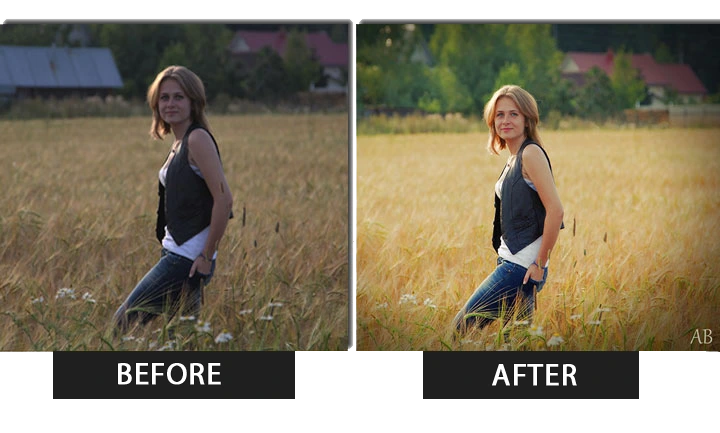
Enhancing the picture quality: before-after
Like the edited picture more than its lifeless original? Then let's enhance your photos as well. To get going, download PhotoWorks on your computer. You can install it absolutely for free.
Once PhotoWorks is launched, you’re ready to switch to our photo editing guide with the following 8 ways. You’ll learn how to improve the quality of a picture by adjusting the exposure, tweaking the color balance, improving the sharpness, cropping, and applying vignette. We’ll also show you how to retouch a portrait, erase odd objects, and add captions to photos. Got intrigued? Then get down to work and turn your regular images into masterpieces.
Way 1. Correct the Exposure Level
One of the biggest problems every photographer faces is poor lighting that ruins the tone and conceals important details. To make a low quality picture high quality, you’ll need to correct its exposure for a start.
- Use auto enhancement. Auto enhance photos with light and color correction. Thanks to smart image editing algorithms, PhotoWorks detects individual lighting issues of each picture and fixes only them without ruining the parts that don’t need any retouching.
- Adjust exposure for better quality. If needed, move the Exposure slider to the right to make the image lighter or to the left to darken it.
- Modify the chosen photo areas. You can also lighten or darken particular areas using Highlights and Shadows. Drag the Shadows and Blacks sliders to -40 and -21, respectively.
- Take care of white balance. The white balance of the photo is also affected by bad lighting. Let’s put the Temperature slider to 44 and the tones will become much warmer.
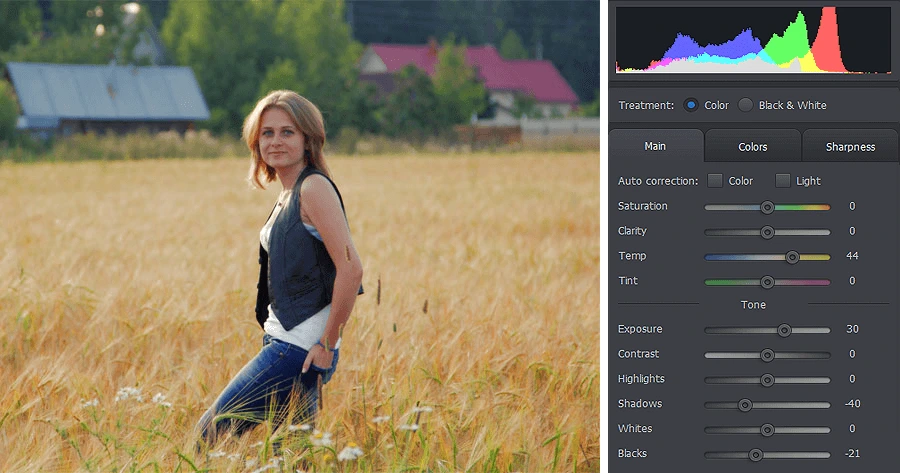
Adjusting the exposure of the photo
Looking for a way to enhance and bring back to life the photos from your family archive? Don't know how to restore the old pictures? With PhotoWorks, you can not only enhance your recent images, but fix the old precious photos as well.
Way 2. Adjust the Color Balance
Color correction is just one step of entire photo editing process but it can make all the difference. Take an average shot and make it really pop with the right colors. Here we have decided to make the roof in the background dimmer and less distracting.
- Correct the overall tone. Switch to the Colors tab. Here, you can control the hue (actual colors), saturation (the amount of grey in a color) and luminance (the ratio of white and black) of your photo.
- Work with separate objects. Change the hue of certain objects. Click Saturation and move the Magentas slider to -100 so the roof becomes less prominent.
- Play with Tone Mapping. Adjust the color balance and shed more light on the photo with Tone Mapping. Pick a suitable color tinge and set the Overlay blend mode for the best effect.
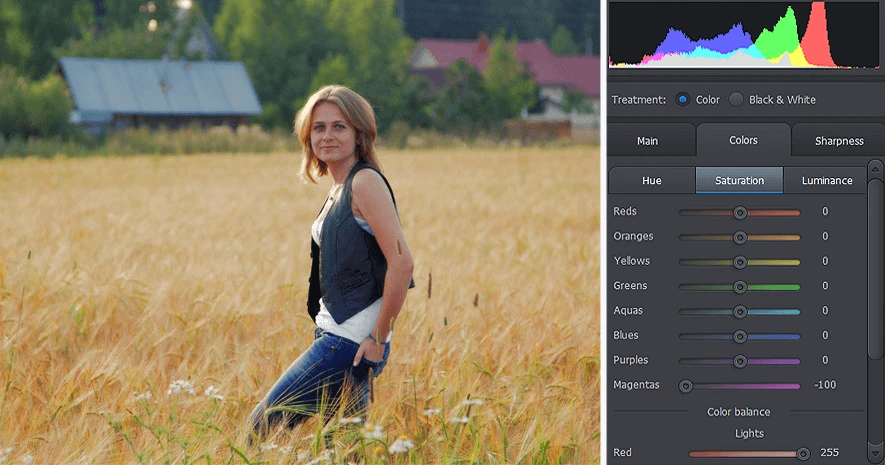
Play with the color balance and change the atmosphere of your photo
Way 3. Increase Sharpness
If your photo looks too blurred and obscure, these imperfections seriously affect its quality. The easiest way is to sharpen the blurry photo so all the small elements will be better seen.
- Zoom in to see the changes. For a start, let’s zoom in the photo we are working with to control all the changes.
- Start enhancing the picture. Next, switch to the Sharpness tab and set the Amount slider at 95.
- Make the photo look natural. If needed, play with the Radius and Threshold settings to make the effect more natural.
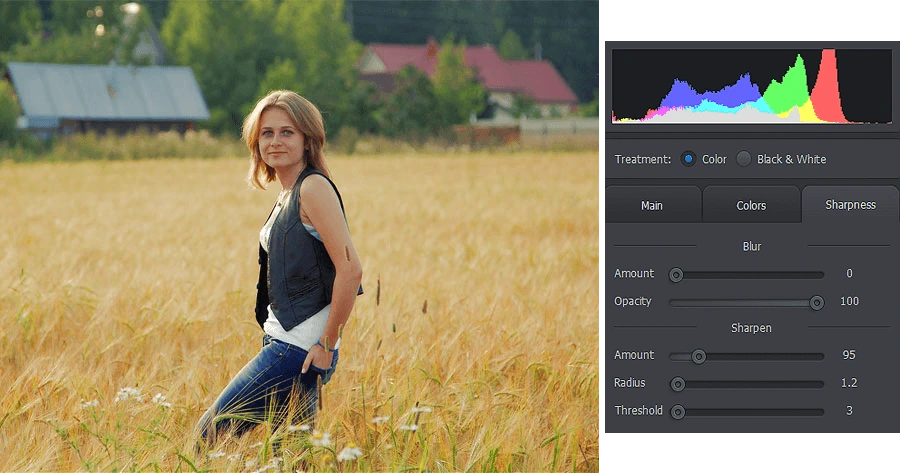
Increase the sharpness settings to highlight small details
With PhotoWorks, you can easily improve the exposure level, color balance and sharpness of a single photo as well as edit multiple pictures at once. Want to know how to enhance photo quality in bulk? Follow the link and learn more about the batch editing process.
Way 4. Crop the Photo
How to make a great portrait photo out of an unimpressive shot? The secret is to improve its composition. If you could not create a perfect scene while shooting, you can still make pictures look better through cropping.
- Try enhancing images with cropping. Click Tools in the upper toolbar of the program window and choose the Crop tool.
- Pick a suitable aspect ratio. The program will offer seven aspect ratios to choose from, like free, fixed, 1:1 square, 16:9 HD, 3:2 iPhone, etc.
- Set a preferred grid overlay. With the right grid overlay you won’t cut any vital parts of your image. In this case, we chose the Rule of Thirds and placed the woman at the intersection of the lines to create a better composition.
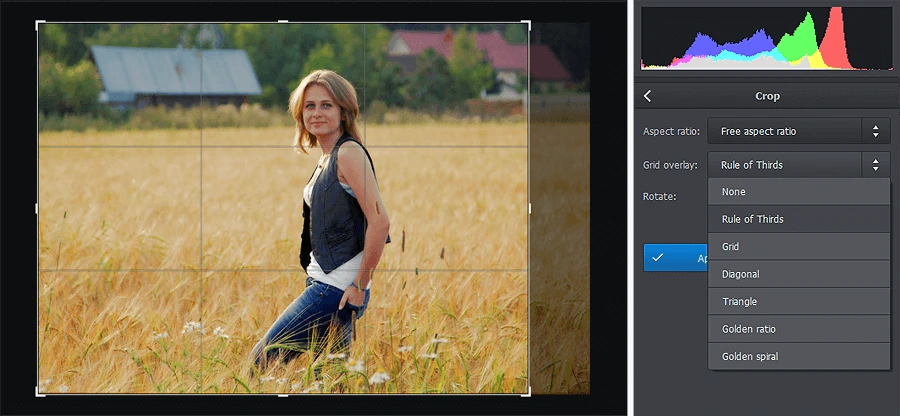
Put the best parts into focus with the Crop tool
While working with the Crop tool, be careful not to make your bad quality photo even worse. Each time you cut away some area of your picture you reduce its resolution. What’s more, if you crop a small image and then try enlarging the edited part, you will end up with a heavily pixelated photo.
Way 5. Apply the Vignette Effect
Artistic effects and masks can also help you improve image quality and give it a stylish look. Here, we’ll highlight the person in the center of the portrait photo by applying a vignette effect. Rounded darkening or lightening will help to guide the viewer’s attention to the woman in the photo.
- Improve picture quality with effects. Move to the Tools tab and click Vignetting.
- Control the vignette amount. In order to darken the image edges, let’s set the Amount slider at -70.
- Manage the vignette size & form. The Roundness and Feather settings will help you control the form of the vignette and soften or harden its edges.
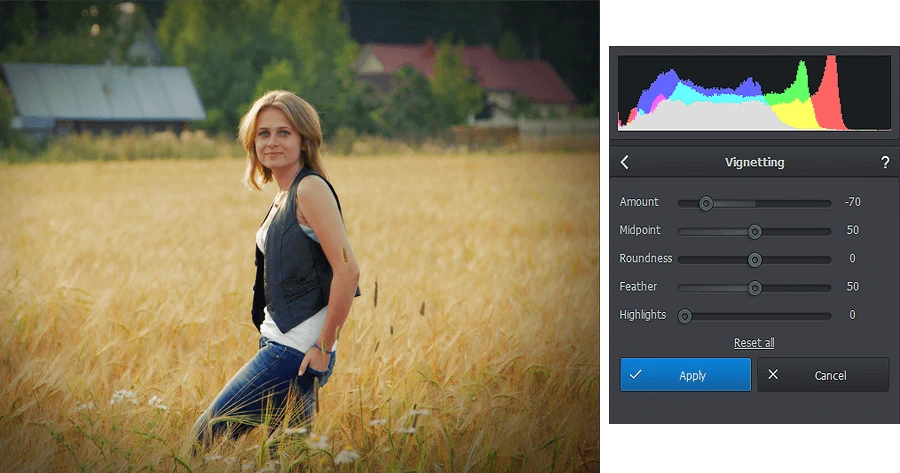
Applying the Vignette effect for a more stylish look
Is there anything you would like to conceal in your photo? Find out how to blur a part of a picture and give it a professional look.
Way 6. Retouch Your Image
Most pictures capture ordinary people, not movie stars, and real people can have glare on their faces, wrinkles around eyes, and skin blemishes. If you look closer at the woman in the picture, you will see the skin is baggy below her eyes. These ‘defects’ are almost impossible to conceal while shooting, but they can be erased in post-production.
- Pick the Adjustment Brush tool. Open the Retouch tab and use the Adjustment Brush to digitally conceal the eye bags.
- Conceal imperfections on the photo. View the photo at 200% scale and set the size of the Adjustment Brush at 3 to fix only the area below the woman’s eyes.
- Smoothen the edited area. Now drag the Exposure slider to 5 to lighten the shadows under the eyes, and apply the result to save the changes.

Way 7. Remove Unwanted Objects
One more way to enhance image quality is to remove unwanted objects from a photo. It can be an unexpected passer-by, a garbage can, or small details you’d rather not show. Here, for example, the grass blade in the foreground is quite distracting.
- Choose the Clone Stamp. While in the program, move to the Tools tab and click on the Clone Stamp.
- Change the brush size. Make the brush a bit bigger than the grass blade and move the tool along the undesired area.
- Borrow pixels from other area. Copy and paste the pixels from the chosen area to the affected one. The chosen area will be automatically replaced with the skin color.
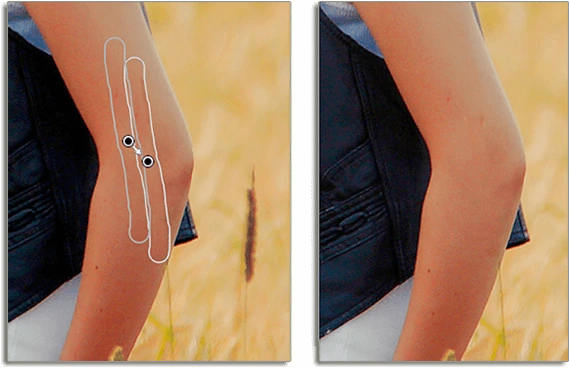
Way 8. Add a Caption
It is common for photographers to sign their works and you can easily do the same! Move to the Captions tab and click Add Text. Type in your name and position it in the image. There is a vast collection of ready-made text styles to choose from, including gothic, funny, calligraphic and graffiti. In Additional settings you can also pick the font you like. Here we have chosen Gabriola to put a caption on a photo since its letters look quite stylish and are big enough to see in the image corner.
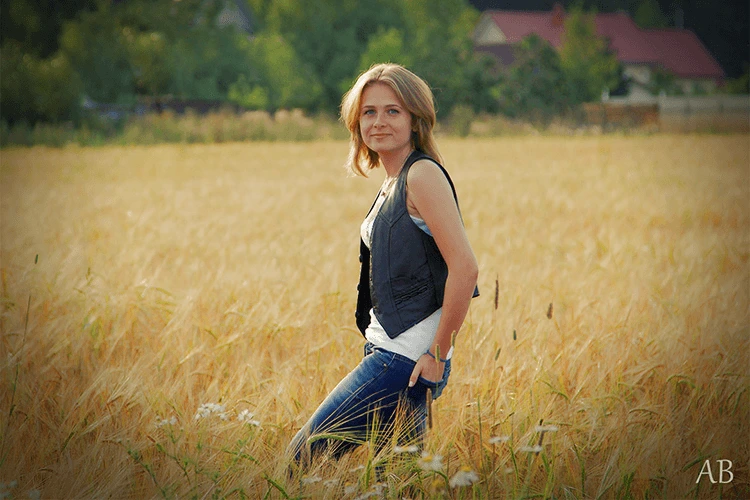
Add a personal signature to mark your photo work
Need to type the same text on a group of photos? No worries - in the Batch Processing Mode, you can add a watermark caption, signature, or date stamp to all of them just in a couple of clicks.
The editing process is not the main point of photo enhancement, is it? What we want are top-notch results which we can’t achieve if we go too hard on post-production. In the example above, we made all the necessary adjustments, but for other pictures, you could make use of the following features:
- put a white background on a picture
- replace the sky with another
- add a border to a picture
- apply funky filters to images
- add a photo to another photo
- whiten the model’s teeth
- change the eye colour in a picture
Still asking yourself how to enhance your photos on Mac or Windows? Watch this video and you’ll discover three simple tricks of photo improvement.

Aren’t the changes amazing? All you need to do to improve the quality of your photos is click the button and install the lightweight photo editor on your computer.
Run the program, import images to PhotoWorks, and finally perfect your pictures.
How to Enhance Image Quality in Other Programs
As we promised, we’ll also show you how to enhance a picture with several other photo editors. Let’s begin with alternatives for computers, e.g., GIMP, a free photo editor available for Windows, Mac, and Linux. The software allows you to fix the composition, adjust colors, remove the red eye effect, delete objects, etc., but its interface might seem cluttered at first. Despite this, GIMP is a good option to get started with.
If you want a program for subtle editing, then go for Adobe Photoshop. There’s a wide range of tools that will help you enhance the picture quality - Lasso, Clone Stamp, Layers, Healing Brush, Liquify filter, and more. For professional results yet simple interface, check out Lightroom. With this software, you can reduce noise, add sharpness, retouch skin imperfections, and even save changes as a preset.
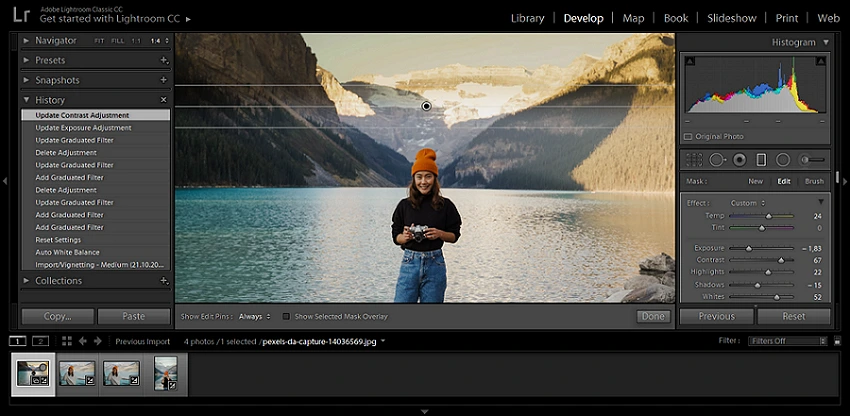
Edit your photos with Adobe Lightroom
Sometimes there’s no access to a computer, but we always have a smartphone at hand. Here’s how to improve the photo quality using a mobile device - for this task, you can download Remini from Google Play or App Store. Just a few taps and your images get sharper, and the unwanted blur is removed. You can also try VSCO, a mobile photo editor packed with pro-level tools. It will let you enhance the quality, add a picture to a picture, apply filters, resize images, and so on. But you’ll need to create an account to use it on your Android or iOS device.
However, imagine a situation when you need to improve a picture for your social page but don’t have the time to master some software. That’s when online photo editors like Canva will come to rescue! This is a browser-based service popular among amateur and professional graphic designers and photographers. You can use ready-made templates, create your own design, and upload your pictures to change them in the built-in photo editor - make basic adjustments, apply filters, crop images, and change their transparency.
Enhance the Photo Quality: Conclusion
Perfect photo editors don’t exist, but you can still find the one that works best for you. In this article, we showed how to enhance a photo using high class software for Windows and Mac, mobile applications, and an Internet photo editor. So you sure will find a suitable option among the ways described above. Yet you won’t regret it if you begin your photo editing journey with PhotoWorks - it doesn’t take up too much space, is beginner-friendly, and guarantees pro-level results. Now give it a try and share your new high-quality photos with your friends.

